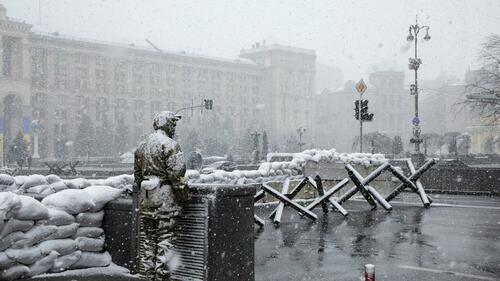One-Third Of Ukraine’s Power Stations Destroyed As WHO Warns Of “Brutal” Winter Ahead
Ukrainian President Volodymyr Zelensky announced Tuesday that up to one-third of all power stations have been attacked by Russian missile and drone strikes over the past week, causing “massive blackouts across the country.”
He called these ongoing strikes against energy infrastructure “terrorist attacks” and said this means there’s “No space left for negotiations with Putin’s regime,” according a tweet.
For more than a week Russia has stepped up an aerial bombardment campaign against dozens of cities and towns which has included widespread use of suicide drones. Ukraine and its Western backers suspect these are Iranian-made drones, cause the EU to threaten new sanctions against Tehran on Tuesday.
Zelensky said in a separate social media post that Russian forces act “insidiously – kills civilians, hits housing, infrastructure,” according to a Telegram statement. “Due to the Russian missile terror in some cities and regions of Ukraine, energy workers have to limit the supply of electricity so that the entire system works stably.”
The Hill on Tuesday wrote of some the latest strikes, “The city of Zhytomyr, which is west of the capital Kyiv, lost power after a double missile strike targeted an energy facility on Tuesday.” The report observed further that “In Kyiv, missile strikes damaged two power facilities and on Monday the city was bombarded by waves of exploding suicide drones.”
Ukraine’s second largest city of Kharkiv, which sits near the Russian border, was also hit in a major attack on its energy infrastructure. This has threatened the power grid in a city with a pre-war population of nearly 1.5 million. Reuters has called it a “deliberate campaign to destroy electricity and water facilities before winter.”
The two Russian regions of Belgorod and Kursk have meanwhile said their populations have been terrorized by shelling attacks from the Ukrainian side of the border. “Train traffic in the Belgorod region was temporarily brought to a halt after shelling struck a railway station and damaged the railroad tracks, the region’s Governor Vyacheslav Gladkov wrote on his official Telegram channel,” The Moscow Times reports.
⚠️ Confirmed: Metrics show internet disrupted in multiple regions of #Ukraine amid reports of Russian missile attacks targeting energy infrastructure; live network data indicate high impact to #Zhytomyr, with #Kyiv and #Dnipro also affected
📰 Background: https://t.co/S0qJQ7kAoV pic.twitter.com/5zTdSW75j4
— NetBlocks (@netblocks) October 18, 2022
“One man was wounded by shrapnel in his legs and two villages experienced power outages, he added,” the publication said. “In the Kursk region, Governor Roman Starovoit reported that Ukraine shelled the villages of Tetkino and Popovo-Lezhachi, also bringing power outages to the region.”
These new waves of Russian attacks on Ukraine’s energy come amid a World Health Organization (WHO) warning for Ukraine and perhaps even all of Europe:
WHO Regional Director for Europe Hans Henri P. Kluge said at the media briefing that the organization is working to anticipate and prepare for the challenges of the approaching “brutal” winter in its humanitarian response to Russia’s war on the country.
Kluge remarked that risk of COVID-19, frostbite, hypothermia, pneumonia, stroke and heart attack will likely increase among Ukrainians who are living “precariously,” whether in substandard shelters, without access to heating or by regularly moving to different locations.
Another day in Ukraine and another barrage of Russian missiles targeting energy infrastructure across the country, with Zhytomyr out of water and electricity and Dnipro power station reportedly hit. Air-defences have shot at least one of the missiles down. pic.twitter.com/MA1BOTiENw
— Matthew Luxmoore (@mjluxmoore) October 18, 2022
“The destruction of houses and lack of access to fuel or electricity due to damaged infrastructure could become a matter of life or death if people are unable to heat their homes,” Kluge emphasized.
Despite billions of dollars in humanitarian aid continuing to flow to Kiev from Western allied governments, the degradation of infrastructure could still take years to fix, especially amid threatening war-time conditions and logistical challenges of getting parts to make rapid fixes.
Tyler Durden
Tue, 10/18/2022 – 10:05

